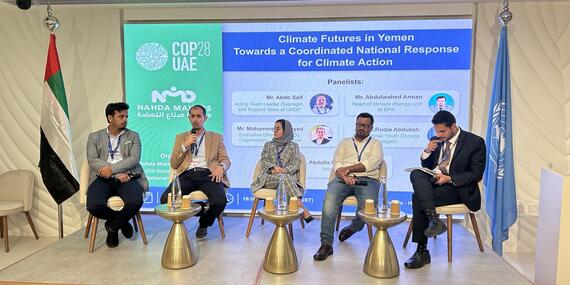Day nine @the Hub

By Hanan Awad
The focus was on Yemen on the ninth day at the Hub. Yemen is placed third globally in the INFORM Index, after Somalia and South Sudan, among the most vulnerable countries to climate change and the least prepared for climate shocks, with temperatures rising faster than the global average over the past three decades. Local non-governmental organizations held two discussions on how to prepare communities and on building more effective partnerships between international and national actors on the ground to address the impact of the climate crisis.
Climate Futures in Yemen: Towards a coordinated national response for climate action; Organizer: Nahda Makers Organization (On behalf of Yemen's National NGOs Forum): The panellists highlighted Yemen's climate change challenges and its capacity to address the impact of the crisis on water resources and food security. As droughts become more severe and rains unpredictable, Yemen's agriculture, the backbone of the rural economy, is struggling to cope with the changing climate. Yemen is one of the world’s most water-scarce countries and current groundwater withdrawals exceed annual recharge.
Panellists discussed approaches to involve key global actors and stakeholders, including UNFCCC, UN agencies, and climate finance entities as Yemen considers ways to enhance people’s resilience and to develop adaptation capabilities. Additionally, the panel emphasized the importance of collaborative efforts between civil society organizations (CSOs), the private sector, and Government entities in achieving effective climate action in Yemen.
Experience in mitigation of disaster risk reduction in (Yemen); Organizer: Benevolence Coalition for Humanitarian Relief (BCHR): Representatives of BCHR and its partners discussed how they were working to mitigate disaster risk by implementing projects that help communities to adapt and to act early ahead of disasters to reduce the impact. The panel also discussed ways to collaborate across various sectors and exchange experiences on disaster risk reduction.
